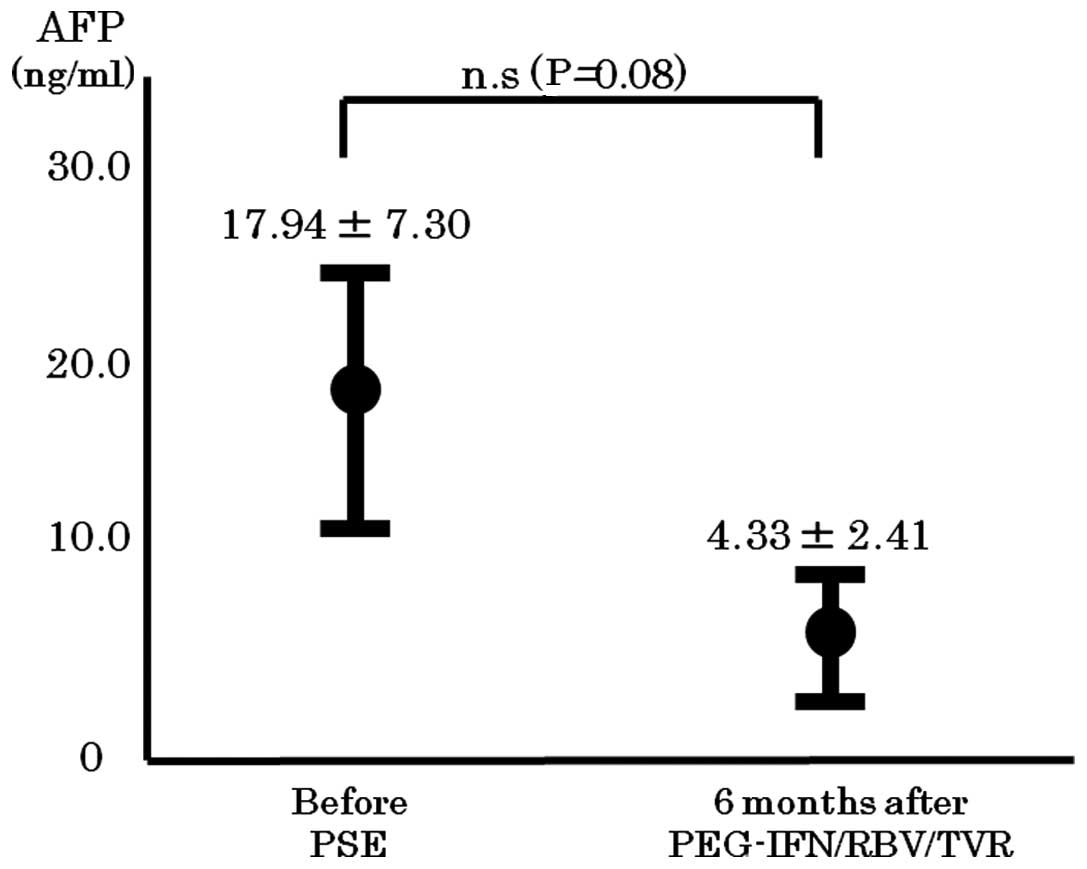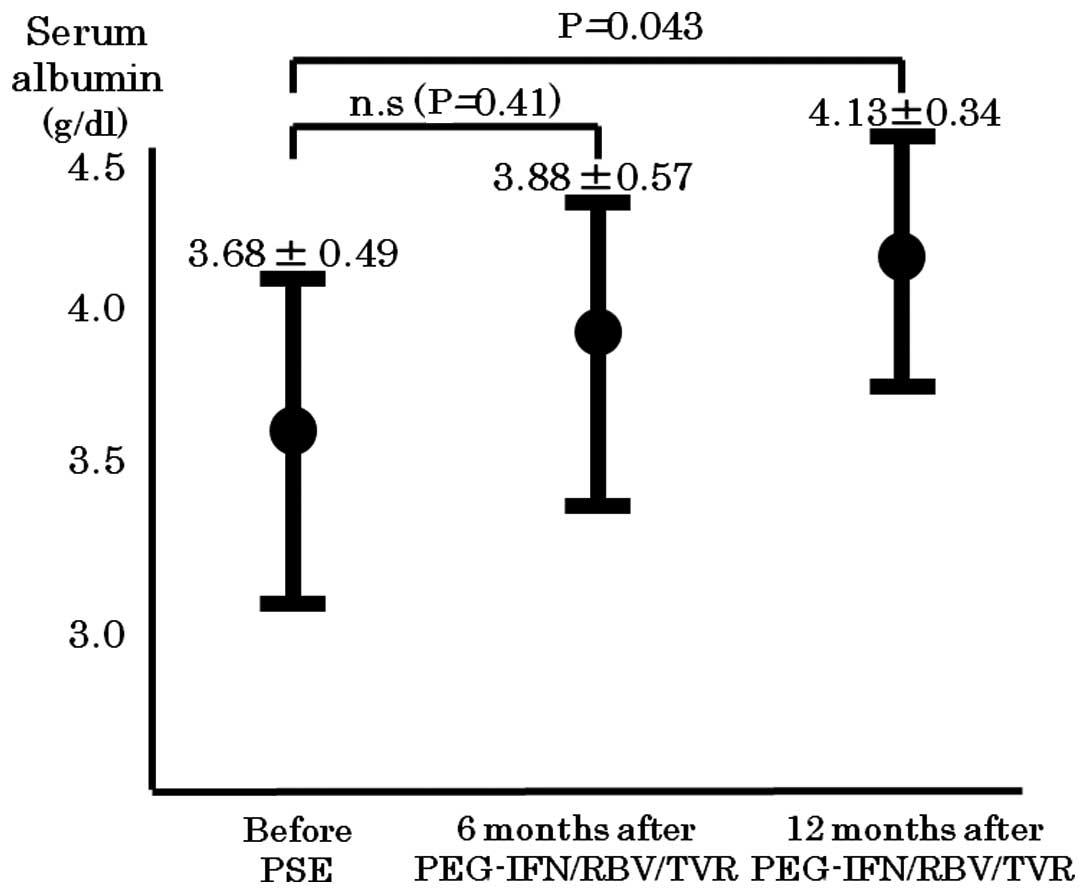|
1
|
Shiffman ML, Ghany MG, Morgan TR, Wright
EC, Everson GT, Lindsay KL, Lok AS, Bonkovsky HL, Di Bisceglie AM,
Lee WM, et al: Impact of reducing peginterferon alfa-2a and
ribavirin dose during retreatment in patients with chronic
hepatitis C. Gastroenterology. 132:103–112. 2007. View Article : Google Scholar : PubMed/NCBI
|
|
2
|
Shimizu H, Takatsuka K, Nakano H, Tenjin
T, Fujikawa T, Yoshida A, Yoshimatsu E, Matsui K and Iwabuchi S:
Long-term evaluation of partial splenic embolization followed by
interferon therapy in patients with hepatitis C virus (HCV)
cirrhosis and thrombocytopenia. Intern Med. 53:925–931. 2014.
View Article : Google Scholar : PubMed/NCBI
|
|
3
|
Hanafiah M, Shahizon AM, Low SF and
Shahrina MH: Severe thrombocytopenia due to hypersplenism treated
with partial splenic embolisation. BMJ Case Rep 2013. pii:
bcr201301016363. 2011.
|
|
4
|
McHutchison JG, Everson GT, Gordon SC,
Jacobson IM, Sulkowski M, Kauffman R, McNair L, Alam J and Muir AJ:
PROVE1 Study Team: Telaprevir with peginterferon and ribavirin for
chronic HCV genotype 1 infection. N Engl J Med. 360:1827–1838.
2009. View Article : Google Scholar : PubMed/NCBI
|
|
5
|
Hézode C, Forestier N, Dusheiko G, Ferenci
P, Pol S, Goeser T, Bronowicki JP, Bourlière M, Gharakhanian S,
Bengtsson L, et al: Telaprevir and peginterferon with or without
ribavirin for chronic HCV infection. N Engl J Med. 360:1839–1850.
2009. View Article : Google Scholar : PubMed/NCBI
|
|
6
|
McHutchison JG, Manns MP, Muir AJ,
Terrault NA, Jacobson IM, Afdhal NH, Heathcote EJ, Zeuzem S,
Reesink HW, Garg J, et al: Telaprevir for previously treated
chronic HCV infection. N Engl J Med. 362:1292–1303. 2010.
View Article : Google Scholar : PubMed/NCBI
|
|
7
|
Zeuzem S, Andreone P, Pol S, Lawitz E,
Diago M, Roberts S, Focaccia R, Younossi Z, Foster GR, Horban A, et
al: Telaprevir for retreatment of HCV infection. N Engl J Med.
364:2417–2428. 2011. View Article : Google Scholar : PubMed/NCBI
|
|
8
|
Ikeda N, Imanishi H, Aizawa N, Tanaka H,
Iwata Y, Enomoto H, Saito M, Iijima H, Iimuro Y, Fujimoto J, et al:
Nationwide survey in Japan regarding splenectomy/partial splenic
embolization for interferon treatment targeting hepatitis C
virus-related chronic liver disease in patients with low platelet
count. Hepatol Res. 44:829–836. 2014. View Article : Google Scholar : PubMed/NCBI
|
|
9
|
Shimizu H, Takatsuka K, Yoshida A,
Yoshimatsu E, Matsui K and Iwabuchi S: Partial splenic embolization
reverses insulin resistance in patients with liver cirrhosis.
Intern Med. 48:747–751. 2009. View Article : Google Scholar : PubMed/NCBI
|
|
10
|
Ogawa E, Furusyo N, Nakamuta M, Kajiwara
E, Nomura H, Dohmen K, Takahashi K, Satoh T, Azuma K, Kawano A, et
al: Kyushu University Liver Disease Study (KULDS) Group: Clinical
milestones for the prediction of severe anemia by chronic hepatitis
C patients receiving telaprevir-based triple therapy. J Hepatol.
59:667–674. 2013. View Article : Google Scholar : PubMed/NCBI
|
|
11
|
Aster RH: Pooling of platelets in the
spleen: Role in the pathogenesis of ‘hypersplenic’
thrombocytopenia. J Clin Invest. 45:645–57. 1966. View Article : Google Scholar : PubMed/NCBI
|
|
12
|
Aoki Y, Hirai K and Tanikawa K: Mechanism
of thrombocytopenia in liver cirrhosis: Kinetics of indium-111
tropolone labeled platelets. Eur J Nucl Med. 20:123–129. 1993.
View Article : Google Scholar : PubMed/NCBI
|
|
13
|
Nagamine T, Ohtuka T, Takehara K, Arai T,
Takagi H and Mori M: Thrombocytopenia associated with hepatitis C
viral infection. J Hepatol. 24:135–140. 1996. View Article : Google Scholar : PubMed/NCBI
|
|
14
|
Ishikawa T, Ichida T, Matsuda Y, Sugitani
S, Sugiyama M, Kato T, Miyazaki H and Asakura H: Reduced expression
of thrombopoietin is involved in thrombocytopenia in human and rat
liver cirrhosis. J Gastroenterol Hepatol. 13:907–913. 1998.
View Article : Google Scholar : PubMed/NCBI
|
|
15
|
Afdhal N, McHutchison J, Brown R, Jacobson
I, Manns M, Poordad F, Weksler B and Esteban R: Thrombocytopenia
associated with chronic liver disease. J Hepatol. 48:1000–1007.
2008. View Article : Google Scholar : PubMed/NCBI
|
|
16
|
Linton RR, Jones CM and Volwiler W: Portal
hypertension; the treatment by splenectomy and splenorenal
anastomosis with preservation of the kidney. Surg Clin North Am.
27:1162–1170. 1947.PubMed/NCBI
|
|
17
|
Goldstone J: Splenectomy for massive
splenomegaly. Am J Surg. 135:385–388. 1978. View Article : Google Scholar : PubMed/NCBI
|
|
18
|
Butler JC, Breiman RF, Campbell JF, Lipman
HB, Broome CV and Facklam RR: Pneumococcal polysaccharide vaccine
efficacy. An evaluation of current recommendations. JAMA.
270:1826–1831. 1993. View Article : Google Scholar : PubMed/NCBI
|
|
19
|
Waghorn DJ and Mayon-White RT: A study of
42 episodes of overwhelming post-splenectomy infection: Is current
guidance for asplenic individuals being followed? J Infect.
35:289–294. 1997. View Article : Google Scholar : PubMed/NCBI
|
|
20
|
Okabayashi T and Hanazaki K: Overwhelming
postsplenectomy infection syndrome in adults - A clinically
preventable disease. World J Gastroenterol. 14:176–179. 2008.
View Article : Google Scholar : PubMed/NCBI
|
|
21
|
Maddison FE: Embolic therapy of
hypersplenism. Invest Radiol. 8:280–281. 1973. View Article : Google Scholar
|
|
22
|
Spigos DG, Jonasson O, Mozes M and Capek
V: Partial splenic embolization in the treatment of hypersplenism.
Am J Roentgenol. 132:777–782. 1979. View Article : Google Scholar
|
|
23
|
Yoshida H, Mamada Y, Taniai N and Tajiri
T: Partial splenic embolization. Hepatol Res. 38:225–233. 2008.
View Article : Google Scholar : PubMed/NCBI
|
|
24
|
Ishikawa T, Kubota T, Horigome R, Kimura
N, Honda H, Iwanaga A, Seki K, Honma T and Yoshida T: Concurrent
partial splenic embolization with transcatheter arterial
chemoembolization for hepatocellular carcinoma can maintain hepatic
functional reserve. Hepatol Res. 44:1056–1061. 2014. View Article : Google Scholar : PubMed/NCBI
|
|
25
|
Amin MA, el-Gendy MM, Dawoud IE, Shoma A,
Negm AM and Amer TA: Partial splenic embolization versus
splenectomy for the management of hypersplenism in cirrhotic
patients. World J Surg. 33:1702–1710. 2009. View Article : Google Scholar : PubMed/NCBI
|
|
26
|
Hayashi H, Beppu T, Masuda T, Mizumoto T,
Takahashi M, Ishiko T, Takamori H, Kanemitsu K, Hirota M and Baba
H: Predictive factors for platelet increase after partial splenic
embolization in liver cirrhosis patients. J Gastroenterol Hepatol.
22:1638–1642. 2007. View Article : Google Scholar : PubMed/NCBI
|
|
27
|
Miyake Y, Ando M, Kaji E, Toyokawa T,
Nakatsu M and Hirohata M: Partial splenic embolization prior to
combination therapy of interferon and ribavirin in chronic
hepatitis C patients with thrombocytopenia. Hepatol Res.
38:980–986. 2008. View Article : Google Scholar : PubMed/NCBI
|
|
28
|
Tahara H, Takagi H, Sato K, Shimada Y,
Tojima H, Hirokawa T, Ohyama T, Horiuchi K, Naganuma A, Arai H, et
al: A retrospective cohort study of partial splenic embolization
for antiviral therapy in chronic hepatitis C with thrombocytopenia.
J Gastroenterol. 46:1010–1019. 2011. View Article : Google Scholar : PubMed/NCBI
|
















